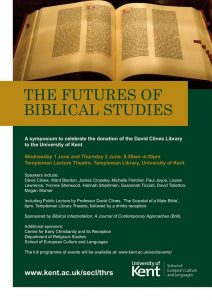The Futures of Biblical Studies
University of Kent, 1-2 June 2016
Rebekah Welton
This conference was the opening event for the newly formed Institut e for Biblical Studies comprising the universities of Exeter, Kent, Sheffield and St Mary’s Twickenham. It also celebrated the launch of a new biblical studies library at the University of Kent, donated from the personal collections of David Clines who also provided us with the key note lecture. I was extremely excited to be presenting a paper at my first ‘proper’ conference – in the sense that previous paper presentations have been at post-graduate events. Sharing your work in a room of leading scholars in one’s own discipline is an altogether different experience to presenting to fellow students from the very broad umbrella of humanities. So whilst I was nervous, I was also excited to be a part of both the ‘real’ world of biblical scholarship and also excited to be a part of the ‘future’ of this discipline.
e for Biblical Studies comprising the universities of Exeter, Kent, Sheffield and St Mary’s Twickenham. It also celebrated the launch of a new biblical studies library at the University of Kent, donated from the personal collections of David Clines who also provided us with the key note lecture. I was extremely excited to be presenting a paper at my first ‘proper’ conference – in the sense that previous paper presentations have been at post-graduate events. Sharing your work in a room of leading scholars in one’s own discipline is an altogether different experience to presenting to fellow students from the very broad umbrella of humanities. So whilst I was nervous, I was also excited to be a part of both the ‘real’ world of biblical scholarship and also excited to be a part of the ‘future’ of this discipline.
The first day had a lovely atmosphere – the first paper was presented by Dr Michelle Fletcher, whom I knew from my time at King’s College London. When I was a mere MA student in the Theology department, Michelle was completing her PhD thesis, and it was great to hear her dissect a commonly held preference in Biblical Studies concerning the imitation of texts in such a lively and engaging manner. Professor Paul Joyce (my MA dissertation tutor at KCL) spoke about biblical interpretation and the humanity of the Bible’s readers and it was a nostalgic experience to once again receive such insight and innovative ideas from him.
After the remainder of the first day’s papers and a well-earned break, we returned for the key note lecture by Prof. David Clines, entitled ‘The Scandal of the Male Bible.’ Clines informed us that the Bible is a book written by men for men, using male language which he terms ‘masclish.’ He argued that this language includes seven aspects portraying and maintaining male ideals: strength, violence, size, holiness, womanlessness, totality-thinking and binary-thinking. The ‘scandal,’ Clines told us, was that people today are not aware that the Bible is not written for women and it therefore may not be best suited for use as a model of equality and justice.
Following the key note was the obligatory drinks reception, a welcome opportunity as a PhD student to chat to the eminent scholars whose papers were heard earlier in the day in order to network and get one’s name ‘out there.’ This lasted for an hour before the postgraduate students were taken to the University’s SU for a drink and some food.
The second day of the conference continued with a few more papers from established scholars, including our own David Tollerton who gave an extremely interesting paper about the use of the Bible in contemporary and future holocaust memorials. It was also great to hear a paper from a former lecturer I had in my undergrad at KCL, Susannah Ticciati (who did remember me and it was lovely to catch up with her). After lunch the conference then turned to the papers of PhD students in two simultaneous sessions. I heard some great papers by fellow postgraduates, including that of Dan McClellan, a study abroad PhD student at Exeter, about the use of cognitive science in Biblical Studies. I look forward to hearing more of his work. I felt my paper, ‘Food Futures in Biblical Studies’ went successfully, I received some great questions and comments at the end and even had the opportunity to debate whether honey in the Bible really was made by bees with Prof. Clines.
I am excited that this new collective has come into being. Many of the papers I heard, especially by fellow PGRs, were exciting, fresh and interdisciplinary, and this is where I think the future of Biblical Studies is located. I look forward to the next event and the opportunities it will highlight about the futures of biblical studies.
